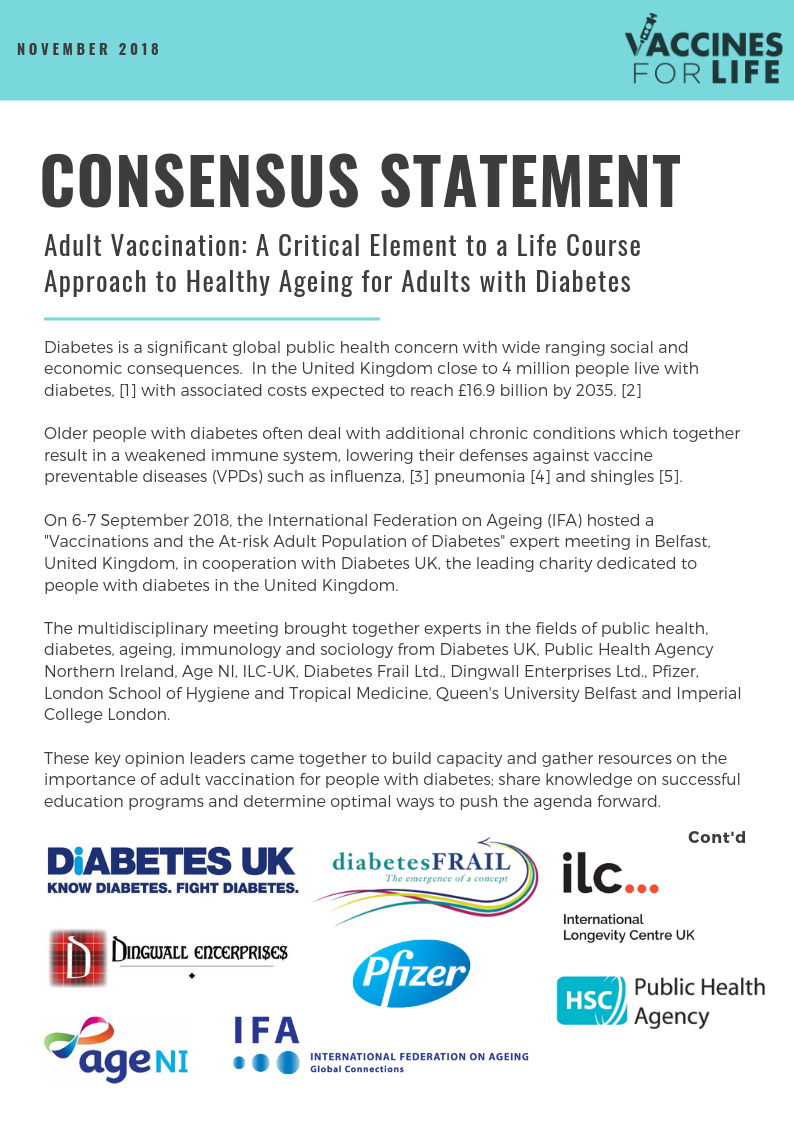Adult Vaccination: A Critical Element to a Life Course Approach to Healthy Ageing for Adults with Diabetes
Consensus Statement
 Diabetes is a significant global public health concern with wide ranging social and economic consequences. In the United Kingdom close to 4 million people live with diabetes,[1] with associated costs expected to reach £16.9 billion by 2035.[2]
Diabetes is a significant global public health concern with wide ranging social and economic consequences. In the United Kingdom close to 4 million people live with diabetes,[1] with associated costs expected to reach £16.9 billion by 2035.[2]
Older people with diabetes often deal with additional chronic conditions which together result in a weakened immune system, lowering their defenses against vaccine preventable diseases (VPDs) such as influenza,[3] pneumonia[4] and shingles.[5]
On 6-7 September 2018, the International Federation on Ageing (IFA) hosted the “Vaccinations and the At-risk Adult Population of Diabetes” expert meeting in Belfast, United Kingdom, in cooperation with Diabetes UK, the leading charity dedicated to people with diabetes in the United Kingdom.
The multidisciplinary meeting brought together experts in the fields of public health, diabetes, ageing, immunology and sociology from Diabetes UK, Public Health Agency Northern Ireland, Age NI, ILC-UK, Diabetes Frail Ltd., Dingwall Enterprises Ltd., Pfizer, London School of Hygiene and Tropical Medicine, Queen’s University Belfast and Imperial College London.
These key opinion leaders came together to build capacity and gather resources on the importance of adult vaccination for people with diabetes; share knowledge on successful educational programs and determine optimal ways to push the agenda forward.
A consensus was met on the following:
- Vaccination is a critical element of a public health strategy to improve and maintain the health and function of older people with diabetes. Therefore, the primary goal of the meeting was to place adult vaccination as an important preventative approach on the agenda of diabetes organizations
- Key barriers to improving uptake rates in this at-risk population are lack of awareness and misinformation surrounding the importance and availability of vaccines to adults with diabetes
- Cross-sectoral collaboration is critical to raising vaccination on the agenda of diabetes organizations, in the form of joint campaigns, statements and conferences
- Adding evidence-based information on the importance of vaccines for people with diabetes to diabetes self-management programs, diabetes management guidelines (i.e. European Diabetes Working Party for Older People) and diabetes conferences has the potential to play an important role in increasing the uptake rate of vaccination for people with diabetes
Using their collective capabilities and resources, this consensus statement represents delegates’ joint commitment to support cross-sectoral organizations to advocate and mobilize knowledge to their members on the importance of vaccination for adults with diabetes.
Consensus Stakeholders
- Jane Barratt International Federation on Ageing
- Megan Acton International Federation on Ageing
- Alan Sinclair Diabetes Frail Ltd.
- Diane Thomson Pfizer
- David Cavan Diabetologist and Author
- Albert Clyde Diabetes UK Support Group, Northern Ireland
- Tom Rush Diabetes UK Support Group, Northern Ireland
- David Sinclair ILC-UK
- Robert Dingwall Dingwall Enterprises Ltd.
- Linda Robinson Age NI
- Peter Passmore Queen’s University Belfast
- Barbara Nicol Diabetes UK Support Group, Northern Ireland
- Colin Nicol Diabetes UK Support Group, Northern Ireland
- Jillian Patchett Diabetes UK, NI
- Alison Quinn HSC Public Health Agency, NI
- Daniel Howarth Diabetes UK
- Xiaoning Xu Imperial College London
- Punam Mangtani London School of Hygiene and Tropical Medicine
- Lindsay Prior Queen’s University Belfast
- Manjyot Singh Sandhar Queen’s University Belfast
References
[1] Diabetes UK, 2017. Diabetes prevalence 2017. Retrieved from https://www.diabetes.org.uk/professionals/position-statements-reports/statistics/diabetes-prevalence-2017
[2] Diabetes UK, 2012. NHS spending on diabetes ‘to reach £16.9 billion by 2035’. Retrieved from https://www.diabetes.org.uk/about_us/news_landing_page/nhs-spending-on-diabetes-to-reach-169-billion-by-2035
[3] Goeijenbier, M., Van Sloten, T. T., Slobbe, L., Mathieu, C., van Genderen, P., Beyer, W. E., & Osterhaus, A. D. (2017). Benefits of flu vaccination for persons with diabetes mellitus: a review. Vaccine, 35(38), 5095-5101.
[4] Garrouste-Orgeas, M., Azoulay, E., Ruckly, S., Schwebel, C., de Montmollin, E., Bedos, J. P., … & Dumenil, A. S. (2018). Diabetes was the only comorbid condition associated with mortality of invasive pneumococcal infection in ICU patients: a multicenter observational study from the Outcomerea research group. Infection, 1-9.
[5] Queenan, J. A., Farahani, P., Ehsani-Moghadam, B., & Birtwhistle, R. V. (2017). The prevalence and risk for herpes zoster infection in adult patients with diabetes mellitus in the Canadian Primary Care Sentinel Surveillance Network. Canadian journal of diabetes.


